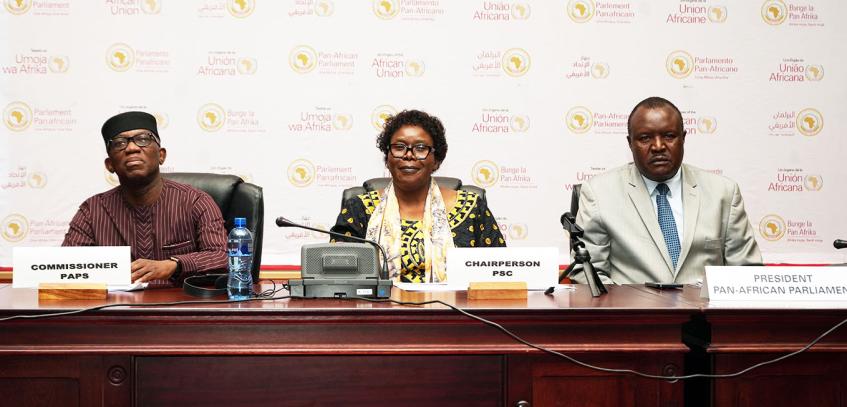The African Union Peace and Security Council (PSC) and the Pan-African Parliament (PAP) have concluded a historic Joint Consultative Meeting, co-chaired by Pan-African Parliament President H.E. Chief Fortune Charumbira and PSC Chairperson H.E. Ambassador Rebecca Amuge Otengo, Permanent Representative of the Republic of Uganda to the AU, which underscored the urgency for Africa to address emerging conflicts, governance deficits, and humanitarian crises by interlinking good governance, peace, security and development, while emphasizing the meaningful participation and engagement of youth, women, children and special interest groups in Africa’s democratic and development agenda.
Held in Midrand, South Africa, at the Headquarters of the PAP, the two AU Organs stressed that Africa’s natural resources must be leveraged to drive industrialisation, value addition, and job creation for youth while calling for enhanced domestic resource mobilisation to reduce dependence on foreign donors and strengthen African ownership of peace and security initiatives as Africa’s own home grown solutions to peace and security challenges on the continent.
H.E. Charumbira emphasised the collective responsibility of AU organs to collaborate, stating, “We are bound by Article 18 of the Protocol Relating to the Establishment of the Peace and Security Council of the African Union to work together in promoting peace, security, and stability. This joint meeting confirms that we can break images of loneliness and work hand-in-hand to silence the guns, ensuring that development and governance prosper.”
H.E. Ambassador Otengo expressed concern about majority of youth in Africa not having stable economic opportunities, and as a result, are vulnerable to recruitment, and radicalisation by extremists who exploit these grievances, while promising them an alternative and better livelihood, noting that, “How Africa handles this demographic growth, will determine whether it turns into a dividend or a divide”.
AU Commissioner for Political Affairs, Peace, and Security, H.E. Ambassador Bankole Adeoye, highlighted the significance of the gathering, noting, “We are making history, 11 years since the last consultation, in a year we have declared as the Year of Justice for all Africans and people of African descent.”
The two-day Joint Consultative meeting concluded with the adoption of Joint Conclusions outlining cooperation priorities that will guide the development of a work plan and roadmap to ensure effective follow-up and implementation. Some of the major resolutions include enhancing PSC–Pan-African Parliament coordination to ensure implementation of the decisions of the Peace and Security Council across member states while improving the effectiveness of early warning systems, joint engagement in election observation missions, and promoting post-conflict and reconstruction and development programmes, as well as peace missions to countries in conflicts and transition. Acknowledged the need for the Pan-African Parliament to report biennially to the PSC on peace, security, and governance activities, ensuring grassroots realities shape continental policy frameworks.
While acknowledging the inextricable link between peace, security and development, the resolution underscored the need for the PAP to champion the establishment of socio-economic programs aimed at economically empowering the people, especially the women, youth, children and special interest groups on the continent so as to reorient them away from the politics of identity to the politics of interests .
It emphasized the importance of respecting diverse cultures, which plays a crucial role in promoting peace and security by fostering unity, social cohesion, and sustainable development for positive change.
In support of Africa’s call for global governance reform, the PSC and Pan-African Parliament committed to advocating for fair representation in global institutions, including the UN Security Council as outlined in the Ezulwini Consensus and Sirte Declaration and the G20,. The conference further endorsed calls for the reform of the global financial architecture to secure debt relief, fair credit ratings, and a transparent, rules-based multilateral trading system that advances Africa’s development interests. Reform of the global tax system to mitigate base erosion and profit shifting was also prioritised to safeguard Africa’s economic stability.
Participants agreed on the critical role of Africa’s natural resources in driving local industrialisation and economic diversification while tackling illicit financial flows and poor governance over mineral resources. They underscored the urgency of addressing terrorism, unconstitutional changes of government, and external interference in African affairs, advocating for African-led solutions to Africa’s challenges as a cornerstone for peace and stability.
The meeting concluded with a commitment to align Africa’s Peace and Security Architecture (APSA) and African Governance Architecture (AGA) under the ongoing AU review process to ensure harmonised frameworks for stability and development across the continent. Participants commended the PSC and PAP Secretariats for successfully convening this milestone consultation, expressing optimism that the outcomes will shape Africa’s peace, security, and governance agenda in the year ahead.
-Ends-








